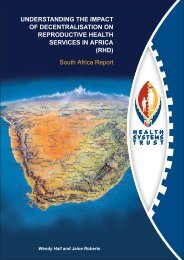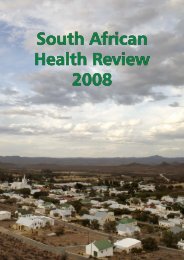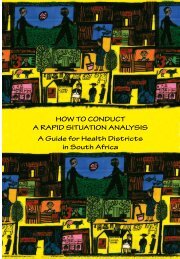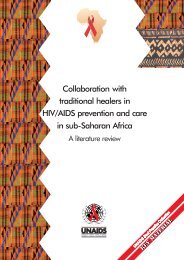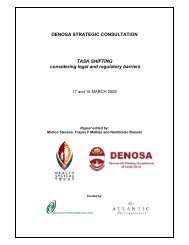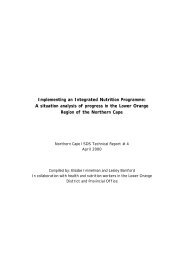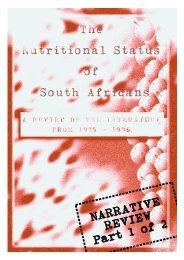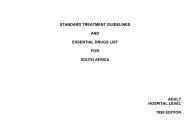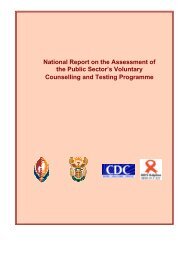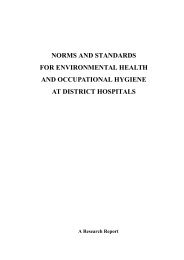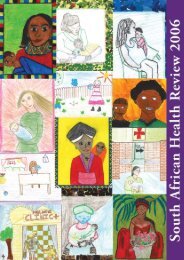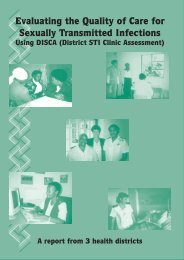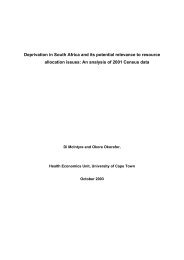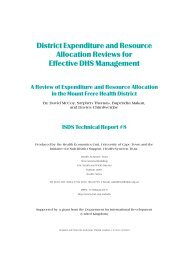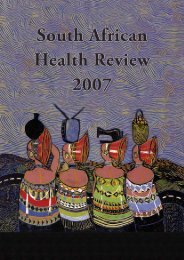PMTCT, and National's - Health Systems Trust
PMTCT, and National's - Health Systems Trust
PMTCT, and National's - Health Systems Trust
You also want an ePaper? Increase the reach of your titles
YUMPU automatically turns print PDFs into web optimized ePapers that Google loves.
There is a need for caution when interpreting these rates as these reflect stated intentions.<br />
There is no data on actual feeding practices nor the outcome of infants in relation to feeding<br />
practices as no prospective follow up was undertaken during this evaluation. A prospective<br />
cohort study commissioned by the National Department of <strong>Health</strong> is underway in three sites<br />
to monitor infant feeding practices.<br />
Infant feeding counselling <strong>and</strong> risk assessment<br />
Infant feeding counselling of pregnant women to make appropriate decisions for themselves<br />
is complex. Counselling can influence <strong>and</strong> bias the choice that mothers make regarding infant<br />
feeding practices. Evidence from this evaluation suggests that there is currently significant<br />
inconsistency <strong>and</strong> misinformation in infant feeding counselling at South African <strong>PMTCT</strong> pilot<br />
sites. In particular, we have seen that poor infant feeding counselling seems to lead to high<br />
intentions to exclusively formula feed in places where free formula milk is provided. As indicated<br />
earlier, in provinces where efforts have been made to increase the training of health workers<br />
on infant feeding, such as Limpopo, KwaZulu-Natal <strong>and</strong> the Free State, fewer HIV positive<br />
women choose to formula feed.<br />
In KwaZulu Natal, although the two <strong>PMTCT</strong> sites (Durban <strong>and</strong> Pietermaritzburg) are quite<br />
similar, more women intend to exclusively breastfeed at the Durban site compared with the<br />
Pietermarizburg site (including the rural area which is part of this site). It is possible that<br />
information on the relative risks of HIV transmission through breastfeeding versus the relative<br />
risks of not breastfeeding is presented differently at various <strong>PMTCT</strong> sites. This could be due<br />
to the fact that the <strong>PMTCT</strong> programme has embraced the opinions expressed by influential<br />
staff <strong>and</strong> infant feeding experts in different regions.<br />
The current <strong>PMTCT</strong> protocol for the pilot sites 3 recommends that counselling on safe infant<br />
feeding should take place both antenatally (during the post test counselling session) <strong>and</strong><br />
postnatally before the first feed. Within the antenatal setting, formal counselling is conducted<br />
mostly by lay counsellors. Very little is known about the extent to which nurses or doctors<br />
reinforce infant feeding options during their consultations with clients. The training of lay<br />
counsellors is largely focussed on counselling for an HIV test <strong>and</strong> training typically consists<br />
of a 2-3 week VCT course run by organisations such as ATICC or Lifeline. The infant feeding<br />
component of counselling is inadequately covered in these training courses largely because<br />
the training was designed to prepare individuals to conduct VCT. Attempts by the DoH to focus<br />
more on infant feeding within <strong>PMTCT</strong> training have also been directed at professional health<br />
workers <strong>and</strong> not lay counsellors. This raises serious concerns regarding the ability of lay<br />
counsellors to accurately present infant feeding options to mothers.<br />
Some provinces have made impressive attempts to assist counsellors in the process of assessing<br />
the suitability of infant feeding options. The illustration below was developed in KwaZulu-<br />
Natal <strong>and</strong> was seen used at the rural Church of Scotl<strong>and</strong> site. It provides a list of determinants<br />
that should be assessed in the counselling session to decide on an infant feeding option. Other<br />
international initiatives are also underway to develop similar counselling tools. The World<br />
<strong>Health</strong> Organisation has developed a set of counselling cards to guide health workers through<br />
various stages of antenatal <strong>and</strong> postnatal support for infant feeding. These cards have been<br />
field tested in South Africa <strong>and</strong> will be incorporated into the <strong>PMTCT</strong> <strong>and</strong> infant feeding training<br />
course.<br />
40



